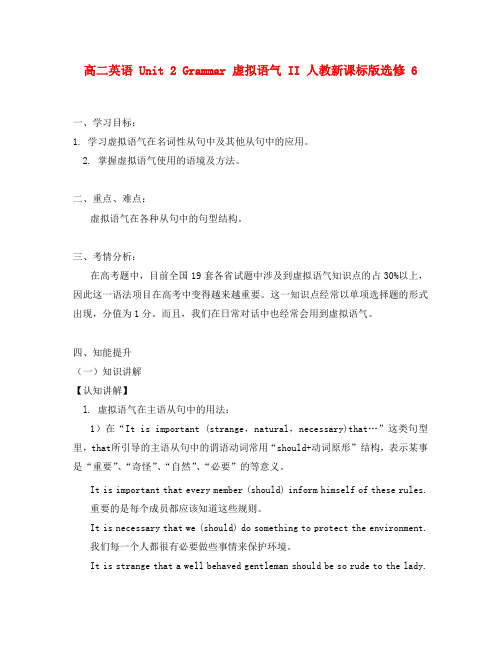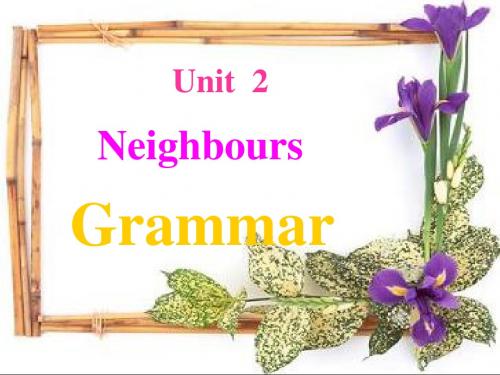Unit2Grammar
- 格式:ppt
- 大小:1.04 MB
- 文档页数:13

Unit2 Grammar 学案Unit 2The Olympic Games学习目标1. 了解一般将来时的被动语态在具体语境中的运用。
2. 掌握一般将来时的被动语态的结构和主要用法。
3. 使用一般将来时的被动语态需要注意的问题。
感受新知Ⅰ. More sentences from the textbook. Give the students several minutes to find out their subject(主语) and predicate(谓语).1. When and where will the next Olympic Games be held?2. Only athletes who have reached the agreed standard for their event will be admitted as competitors.3. All the stadiums will be built to the east of London.4. New medals will be designed of course. . .Ⅱ. Conclusion of the rules1. 基本概念一般将来时的被动语态表示的事情。
2. 一般将来时的被动语态的各种句式++be done. . .++be done?3. 注意:在时间、条件状语从句中, 常用的被动语态代替的被动语态。
如:When the dam is completed, the river will be controlled.大坝竣工后, 这条河的河水将得到控制。
Ⅲ. Consolidation1. Fill in the blanks with the right form of the given words.(1)We (not punish) if we break the rule.(2)The exam (not put off).(3)His new novel (publish) next week.(4)The sports meet (hold) on April 10th.(5)The problem (discuss)at tomorrow’s meeting.2. Translate the sentences into English.(1)这些旧建筑什么时候被拆除?(2)我不会因为自己的错误而受到父亲的惩罚。

高二英语 Unit 2 Grammar 虚拟语气 II 人教新课标版选修 6一、学习目标:1. 学习虚拟语气在名词性从句中及其他从句中的应用。
2. 掌握虚拟语气使用的语境及方法。
二、重点、难点:虚拟语气在各种从句中的句型结构。
三、考情分析:在高考题中,目前全国19套各省试题中涉及到虚拟语气知识点的占30%以上,因此这一语法项目在高考中变得越来越重要。
这一知识点经常以单项选择题的形式出现,分值为1分。
而且,我们在日常对话中也经常会用到虚拟语气。
四、知能提升(一)知识讲解【认知讲解】l. 虚拟语气在主语从句中的用法:1)在“It is important (strange,natural,necessary)that…”这类句型里,that所引导的主语从句中的谓语动词常用“should+动词原形”结构,表示某事是“重要”、“奇怪”、“自然”、“必要”的等意义。
It is important that every member (should) inform himself of these rules.重要的是每个成员都应该知道这些规则。
It is necessary that we (should) do something to protect the environment.我们每一个人都很有必要做些事情来保护环境。
It is strange that a well behaved gentleman should be so rude to the lady.真奇怪,那个举止得体的绅士竟然对那位女士如此粗鲁。
2)It is ordered/suggested that…从句that引导的主语从句的谓语动词用“(should)+v.”结构。
这一类的动词还有:propose, require, demand, request, insist, ask等。
It is ordered that the cloth (should) be woven right now.命令传来,应该马上织布。




Unit 2 Let’s play sports!Grammar1.含有实义动词的一般现在时态的句子转换(1)动词原形肯定句:We have lessons from Monday to Friday.否定句:We don’t have lessons from Monday to Friday.一般疑问句:Do you have lessons from Monday to Friday?肯定回答:Yes,we do.否定回答:No,we don’t.(2)动词三单形式肯定句:He swims in summer.否定句:He doesn’t swim in summer.一般疑问句:Does he swim in summer?肯定回答:Yes, he does. 否定回答:No, he doesn’t.练习:1)Mr. Black comes from London (对划线部分提问)________ ________ Mr. Black ________ from?2)She drinks milk every morning. (改一般疑问句,并作否定回答)________ she ________ milk every morning? ________ , she ________.3)She enjoys watching TV (改为否定句)She ________ ________ watching TV.4)Amy likes reading and drawing.(对画线部分提问)_______ _______ Amy like?5)There is only one lion in the zoo.(划线提问)__________________________________________________6)There are many people over there.(划线提问)_______________________________________________7)写出下列单词的第三人称单数形式:like________ study________ watch________cry________ dress________ fix________Key: 1.Where does, come 2.Does, drink, No, doesn’t 3. doesn’t enjoy4.What does5.How many lions are there in the zoo?6.How many people are there over there?7.likes, studies, watches, cries, dresses, fixes1.Do Sandy and Kitty play computer games? Do you play football at weekends? But my dad sometimes watches our games. Sometimes he reads at home, and my mum often shops at weekends.【1】词组play computer games:玩电脑。
译林牛津英语9BUnit 2grammar基础知识梳理:1.work on the computer / work on a history projectwork out /work hard at /work as /work for2.interview an astronaut = have an interview with an astr onautn. interviewer3.leave for Shanghai4.practice playing the piano practise doing practice n. practical adj.5.search for information on the Internet6.read through all the passages without stopping7.The competition is well worth taking part in. be (well)worth do ing/n.8.make a great difference to our daily life9.change the way we live10.in ancient timese salt to help them keep fish or meat for a longer time12.go bad /go missing / go hungry / go wrong13.With the invention of the washing machine, people needn’t wash clothes by hand. / make journeys morecomfortable12. 他总是设法独自做每一件事。
He always manages to do everything by himself.13 宇航员们目前为下一次飞行做准备。